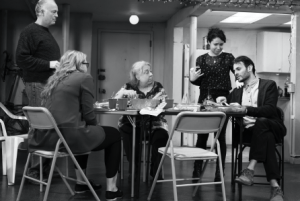

On the surface, The Humans, which just opened at the Helen Hayes Theatre on Broadway after the Roundabout Theater Company's sold out Off-Broadway run, may seem small, spatially and narratively constrained. And yet, the action that transpires over one Blake family Thanksgiving in Chinatown feels like the most epic and vital piece of theater on stage in a long time; Stephen Karam has written a play that stands for its time.
Directed by Joe Mantello, the play opens as Erik, patriarch of the Blake clan arrives, alone, to a apartment bathed in darkness -- but only for a moment, as his family soon rushes in behind him: his two daughters, Aimee and Brigid, his wife, and his mother, who is wheelchair bound and has succumb almost entirely to dementia. The elder three have made the journey from Scranton, PA, along with Aimee, to spend Thanksgiving at Brigid's Chinatown ground floor duplex - a Unicorn in the New York City real estate world - which she just moved into with her much older boyfriend, Rich.
The careful, relatable mundanity of the plot serves as a springboard for the profound conflicts of everyday existence, most notably the starkness of the generational contrast between the parents and their three younger counterparts. The formidable cast so brilliantly embody their roles that it's difficult to believe that they walk off stage and into their real lives. For an hour and a half, they are, without doubt, the Blakes, an Irish Catholic family raised on religion and working class values.
Erik, played by Reed Birney, and Deirdre (Jayne Houdyshell) have both been working the same job for upwards on three decades -- he as a handyman for a Catholic school and she as an office manager. Taking care of his mother (Lauren Klein) known affectionately as "Momo," has been an increasing emotional and financial burden. Aimee, portrayed by Cassie Beck, is lawyer whose struggle with ulcerative colitis has derailed her track to partnership. To make things worse, she's left heartbroken after a split with her longtime girlfriend.
Throughout the play, the actors move between the upstairs, where the bathroom lies, and the down, where they gather to eat. The challenge between moving upstairs and down visually depicts the distance between the generations; Deirdre can barely manage the spiral staircase with her knees, grandma's wheelchair means she has to be taken out of the apartment and up the elevator, and the stairs become the only conduit through which both levels can communicate -- otherwise, the upstairs cannot hear the down.

The Humans reminds us of the singular loneliness of existence -- the secrets we keep from even those closest to us; certain burdens we have no choice but to shoulder on our own. But it also reminds us of the enduring strength of family, that we carry on through our traditions: the family members harmonize together on "The Parting Glass" and take turns sharing thanks and smashing the "Peppermint Pig," they hug and yell, but then hug again.
The beauty in the generational disconnect is that it is often the result of good intentions, each forebearer hoping to give his or her children a better life. "Pursuing your passion is a gift," Erik reminds the entitled Brigid (Sarah Steele), though her struggles with massive student loans and inability to find work in her desired field of music are no less pertinent to her than Erik's worries are to him. The Humans hinges on this dialectic between the old world of sacrifice, physical work, suburbia, settling down and marrying, defining your moral code though religion, and the new world of superfoods, the pursuit of intellectual passion, therapy, gentrification of urban areas, and agnosticism. "On a cruise we feel taken care of," Deirdre tells Rich, played by Arian Moayed, to which he responds, "I prefer to wander of the beaten path." The play is full of these minute but monumental battles.
The Humans is not a thriller, and it is, perhaps, reductive to label it thusly, yet it's easy to see how it could be perceived as such: strange, thunderous noises roar from the floor above and the laundry room below, lights flicker and burn out, the grandma babbles and shrieks. At one point, Rich and Erik share the dreams that have been keeping them up at night, and debate the true darkness that lies at the heart of the play. In every horror story, monsters are scared of us: Dracula of Van Helsing, zombies of the humans that hunt them. We create monsters to stand for the terrors of our everyday existence -- the reality of age, death, and decay -- to frighten ourselves.
It is impossible not to see yourself in The Humans, to see your mother, your father, and your siblings. Given the opportunity, this play will move you, and it can -- and likely will be -- pondered and parsed for many years to come.